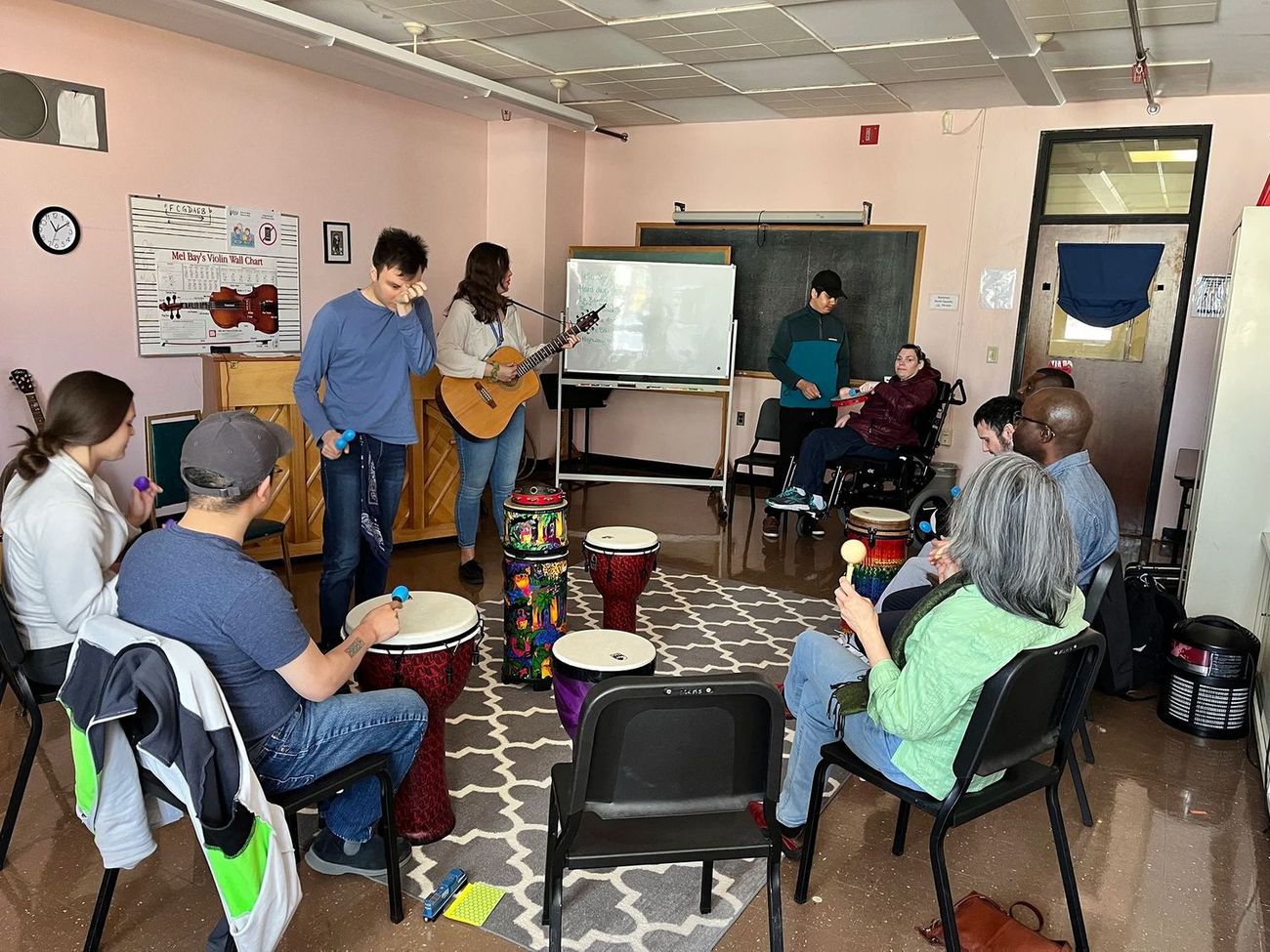Home>Events & Info>Acapella>How To Start Acapella Group


Acapella
How To Start Acapella Group
Modified: January 22, 2024
Learn how to start your own Acapella group with our step-by-step guide. Discover the key elements needed for a successful Acapella group and start harmonizing today.
(Many of the links in this article redirect to a specific reviewed product. Your purchase of these products through affiliate links helps to generate commission for AudioLover.com, at no extra cost. Learn more)
Table of Contents
Introduction
Are you passionate about music? Do you love the captivating harmonies and rich vocal textures of acapella music? Starting an acapella group can be an exciting and fulfilling endeavor for music enthusiasts like yourself. Whether you’re a seasoned singer or just starting out, forming an acapella group allows you to collaborate with others, showcase your vocal talents, and create beautiful music together.
In this article, we will guide you through the process of starting your own acapella group from scratch. From finding members to rehearsing and performing, we will cover all the essential steps to help you build a successful and harmonious group. So, let’s dive in and get started!
Before we begin, it’s important to understand what acapella music is all about. Acapella, derived from the Italian term “a cappella,” means “in the manner of the chapel.” Acapella music is performed without any instrumental accompaniment, relying solely on human voices to create harmony, melody, and rhythm. It showcases the incredible versatility and capabilities of the human voice in producing a wide range of musical sounds.
Starting an acapella group can be an enjoyable and rewarding experience. Not only will you have the opportunity to create beautiful music, but you’ll also develop strong bonds with your fellow singers and perform in various venues. So, if you’re ready to embark on this musical journey, let’s explore the steps involved in starting your own acapella group.
Finding Members
Building a successful acapella group starts with finding the right members who share your passion for music and are committed to creating harmonious arrangements. Here are some strategies to help you find talented individuals to join your group:
- Spread the word: Let your friends, family, and acquaintances know that you’re starting an acapella group. They might have connections or know someone who would be interested in joining.
- Post on social media: Utilize platforms like Facebook, Instagram, and Twitter to announce your search for acapella group members. Include details about the genre you’re interested in and any specific vocal requirements.
- Attend open mic nights and music events: Network with other musicians and singers by attending open mic nights, local concerts, and music workshops. You might come across talented individuals who are looking for opportunities to collaborate.
- Join online communities and forums: Explore online communities and forums dedicated to acapella music. Engage in discussions, share your intentions of starting a group, and connect with like-minded individuals who share your passion.
- Auditions: Organize auditions to assess the vocal abilities and compatibility of potential group members. Prepare a few songs for the auditions that highlight the various vocal ranges and abilities your group will require.
When forming an acapella group, it’s important to find members who not only possess exceptional vocal skills but also have a positive attitude, good work ethic, and a willingness to contribute to the group’s success. Look for individuals who are dedicated, committed, and bring a unique perspective to the table.
Remember, diversity in voice types and musical backgrounds can greatly enrich the dynamics of your acapella group. Aim for a balanced combination of soprano, alto, tenor, and bass voices to create well-rounded harmonies.
Once you’ve found potential members, it’s crucial to hold discussions and rehearsals to ensure everyone is on the same page. Establish clear expectations, goals, and commitment levels to maintain a focused and dedicated group. Communication is key, so keep an open dialogue with your members to foster a supportive and collaborative environment.
In the next section, we’ll explore the process of choosing a genre for your acapella group. Stay tuned!
Choosing a Genre
When starting an acapella group, one of the most important decisions you’ll make is selecting a genre. The genre you choose will shape the style of music you perform and attract a specific audience. Here are some factors to consider when choosing a genre for your acapella group:
- Personal Preference: Consider the type of music you and your group members are passionate about. Whether it’s pop, jazz, rock, classical, or gospel, selecting a genre that resonates with everyone’s preferences will foster enthusiasm and dedication.
- Group Dynamic: Think about the vocal range and abilities of your group members. Understanding their strengths and limitations will help you choose a genre that showcases their talents and allows for harmonious arrangements.
- Audience Appeal: Consider the demographics of your target audience. If you’re aiming to perform at certain venues or events, choose a genre that aligns with the preferences of those audiences.
- Market Demand: Research the local music scene and determine if there’s a demand for a particular genre. You want to make sure there are opportunities to perform and grow your fanbase.
- Uniqueness: Consider choosing a genre that sets your acapella group apart from others. Adding a unique twist or incorporating elements from different genres can help you stand out and attract attention.
Once you’ve identified the genre you want to pursue, it’s time to start selecting songs that fit within that genre. Experiment with different arrangements and adaptations to make the music your own. When choosing songs, consider their suitability for acapella performance, including vocal harmonies, rhythmic elements, and overall appeal.
Remember, the genre you choose is not set in stone. As your group evolves and matures, you can explore different genres and expand your repertoire. Flexibility and an openness to experimentation will keep your group dynamic and exciting.
In the next section, we’ll delve into voice training and techniques to enhance the skills of your acapella group members. So, let’s keep the harmony going!
Voice Training and Technique
Building a strong foundation of vocal skills and technique is essential for any acapella group. Here are some important aspects to consider when it comes to voice training and technique:
- Vocal Warm-ups: Start each rehearsal or performance with vocal warm-up exercises to prepare the vocal cords and muscles. These exercises can include lip trills, sirens, scales, and breathing exercises. Warm-ups help improve vocal flexibility, control, and overall vocal health.
- Breathing Techniques: Proper breathing is essential for singing. Teach your group members diaphragmatic breathing, where the breath is drawn deep into the abdomen. This type of breathing ensures optimal breath support and control.
- Posture and Alignment: Encourage good posture and alignment while singing. Remind your group members to stand tall, relax their shoulders, and keep their chin parallel to the ground. Good posture enhances vocal projection and helps prevent strain on the muscles.
- Pitch Accuracy: Work on pitch accuracy by practicing intervals, scales, and melodic exercises. Use pitch reference tools like pitch pipes or piano accompaniment to ensure your group members are singing in tune.
- Vocal Range Development: Help your group members explore and expand their vocal ranges. Practice exercises that gently push the limits of their current range, gradually expanding their capabilities over time.
Regular vocal coaching or training sessions can greatly benefit the skills and growth of your acapella group members. Consider bringing in professional vocal trainers or voice coaches to conduct workshops and provide guidance.
Remember, voice training and technique are ongoing processes. Continuously encourage your group members to practice and improve their vocal skills. The more they invest in their individual vocal growth, the stronger and more captivating your acapella group will become.
In the following section, we’ll explore the art of arranging songs to suit your acapella group’s unique style. So, let’s continue on this melodious journey!
Arranging Songs
Arranging songs for your acapella group is a creative and critical process that brings your chosen genre and vocal abilities to life. Here are some key considerations when it comes to arranging songs:
- Song Selection: Choose songs that showcase the strengths and vocal range of your group members. Consider the style, complexity, and emotional appeal of the songs. You want to choose pieces that resonate with both your group and your audience.
- Vocal Parts: Determine the vocal parts for each song. Typically, acapella arrangements consist of soprano, alto, tenor, and bass parts, with additional vocal percussion if desired. Assign parts based on the strengths and abilities of your group members.
- Vocal Harmonies: Craft harmonies that complement the melody and create a rich and captivating sound. Experiment with different chord progressions, voicing options, and vocal layering to enhance the arrangement.
Arranging songs can be a collaborative process. Encourage your group members to provide input and suggestions for the arrangements. This fosters a sense of ownership and enhances the overall cohesion of your acapella group.
There are also resources available online, such as sheet music or arrangement templates, that can aid in the arrangement process. These resources can provide a starting point or inspiration for your own unique arrangements.
Remember, arranging songs requires time, creativity, and attention to detail. The result will be truly unique and tailored to your acapella group’s style and abilities.
Next, we’ll discuss the importance of rehearsing and performing to fine-tune your acapella group’s skills and captivate your audience. So, let’s continue on this musical journey together!
Rehearsing and Performing
Rehearsing and performing are crucial components of honing your acapella group’s skills and captivating your audience. Here are some key aspects to consider when it comes to rehearsing and performing:
- Establish a Schedule: Set a regular rehearsal schedule that works for all group members. Consistency is key in developing cohesion and skill progression within the group. Plan rehearsals in advance and ensure everyone is committed to attending.
Rehearsing and performing is not only about perfecting the songs, but also about building a connection with your fellow group members and the audience. Enjoy the process, support one another, and celebrate your achievements together.
Next, we’ll explore the importance of building a repertoire for your acapella group. So, let’s continue harmonizing and creating beautiful music!
Building a Repertoire
Building a diverse and captivating repertoire is essential for any acapella group. Your repertoire consists of the songs you perform and showcases the range and versatility of your group’s talents. Here are some key steps to consider when building a repertoire:
- Song Selection: Choose songs that align with your group’s genre and style. Consider the preferences of your target audience and the vocal abilities of your group members. Aim for a balance of popular hits, classic favorites, and lesser-known gems to cater to a wide range of listeners.
Remember, a well-crafted repertoire is a reflection of your group’s identity and musical prowess. Ensuring diversity, versatility, and quality in your song choices will help you captivate audiences and leave a lasting impression.
Next, we’ll delve into the importance of promoting your acapella group to expand your reach and attract more opportunities. So, let’s continue on this melodic journey!
Promoting Your Acapella Group
Promoting your acapella group effectively is crucial for gaining visibility, attracting opportunities, and growing your fanbase. Here are some strategies to consider when it comes to promoting your acapella group:
- Create a Website or Social Media Presence: Build an online presence for your acapella group by creating a website or establishing profiles on popular social media platforms. Share information about your group, upcoming performances, and post engaging content to keep your followers interested.
Remember, promoting your acapella group requires consistency, creativity, and perseverance. Be proactive in seeking opportunities, interacting with your audience, and refining your promotional strategies to achieve optimal results.
In the next section, we’ll explore the benefits of collaborating with other musicians and vocalists to enhance your acapella group’s versatility and growth. So, let’s continue on this harmonious journey!
Collaborating with Other Musicians
Collaborating with other musicians and vocalists can greatly enhance the versatility, creativity, and growth of your acapella group. Here are some key benefits and strategies when it comes to collaborating:
- Diversify your Sound: Collaborating with musicians from different genres or vocalists with different styles can add new dimensions to your acapella group’s sound. Embrace the opportunity to explore different musical styles and experiment with unique arrangements.
If you’re interested in collaborating, reach out to musicians and vocalists who inspire you or align with your musical goals. Attend local music events and network with other artists. Be open to opportunities and always approach collaborations with a spirit of cooperation and shared creativity.
Collaborations can be transformative for your acapella group, helping you break boundaries, explore new musical territories, and reach new heights of excellence. So, embrace the power of collaboration and watch your group soar!
Next, we’ll discuss the steps to take your acapella group to the next level, from professional development to performance opportunities. So, let’s embark on this thrilling musical journey together!
Taking Your Group to the Next Level
Once your acapella group is established and thriving, it’s natural to aspire to take it to the next level. Whether it’s expanding your reach, securing more performance opportunities, or pursuing professional growth, here are key steps to elevate your acapella group:
- Professional Development: Invest in professional development to refine your skills and expertise. This may include vocal coaching, attending workshops or masterclasses, or even pursuing music degrees or certifications. Continuous learning and improvement are essential for long-term growth.
Remember, taking your acapella group to the next level requires dedication, perseverance, and a strong vision. Embrace the challenges and aim for continual growth as you navigate the music industry.
Lastly, as you embark on this journey of growth and exploration, always stay true to your passion for acapella music and the joy it brings. Allow your love for music to shine through in every note and performance.
Conclusion
Starting an acapella group is an exciting and fulfilling endeavor that allows you to create beautiful music, form meaningful connections, and showcase your vocal talents. Throughout this article, we have explored the essential steps in starting and nurturing a successful acapella group.
From finding the right members who share your passion for music to choosing a genre that resonates with your group and audience, each decision plays a pivotal role in shaping your group’s identity. Voice training and technique are essential for honing your vocal skills and achieving harmonious arrangements. Building a diverse repertoire, promoting your group, and collaborating with other musicians further enrich your musical experience.
Taking your acapella group to the next level requires dedication, continuous learning, and a strategic approach to marketing and performance opportunities. However, throughout this journey, it’s important to stay true to your passion, nurture collaboration, and embrace the joy that acapella music brings.
Remember that success comes not only from achieving milestones and accolades but also from the impact you have on your audience and the connections you forge along the way. Share your love for acapella music, inspire others, and create magical moments through your performances.
So, whether you’re just starting out or looking to elevate your existing acapella group, we hope that the insights and strategies shared in this article will guide you towards building a harmonious and successful journey in the world of acapella music.
Now, go forth and let the power of your voices resonate, enchant, and captivate audiences around the world!











